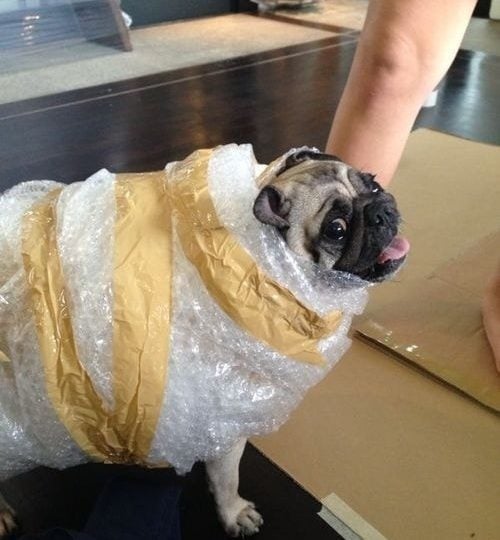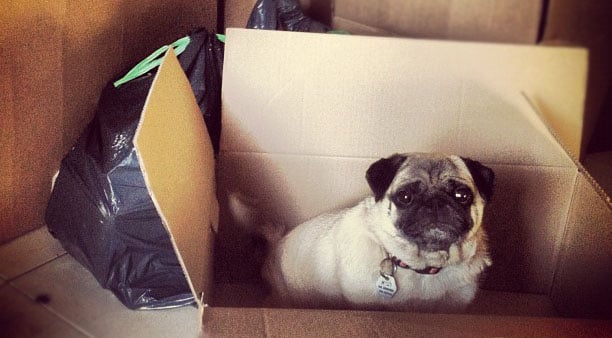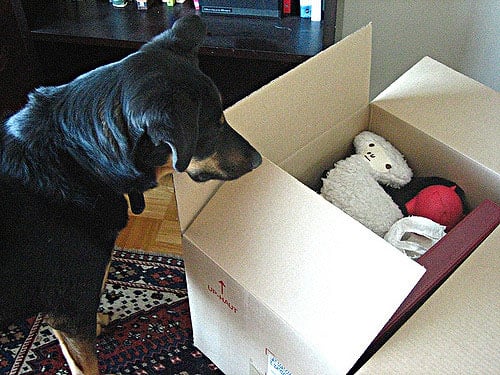Moving is almost always stressful, and not just for humans—it’s tough on dogs, too. If you’re moving with your dog and wondering how to help your dog adjust to a new home, we’ve got your answers. You can make the process a little less painful by following these expert tips before, during, and after your move.
Plan ahead to avoid surprises
- Check the local laws: Find out if you need a new license, what the leash laws are, and whether there are breed bans in place. Your new landlord might be fine with a Rottweiler but some local governments, neighbourhood associations, and insurance companies do not allow certain breeds.
- Find a new vet: Don’t wait until your dog gets injured or sick. Do some research to find out if they’ll need any new vaccinations or preventative medications. Does your new area have ticks, heartworm, or leptospirosis?
- Get your dog microchipped and put be certain your cell phone number is on their collar.
- Make sure your dog has identification: “We’ve all read the wonderful stories about dogs who were lost during a household move and eventually found their way home across country,” says Dr. Mary Beth Leininger of ASPCA Health Insurance. “This is so rare that it’s always news. Better to have an ID tag on the pet’s collar and have your veterinarian microchip the dog for permanent identification.”
Prepare your dog for the trip
- Crate train your dog now if you’ll be needing one for the move. Most dogs love crates, but no one wants to be forced into one for the first time on moving day.
- Use the Car-GO or other soft-sided pop-up crates.
Pet product expert Dana Humphrey recommends the Car-GO
because it is simple to set up and to store.
- Packing up: You may have noticed your dog getting nervous the last time you pulled out a suitcase for a trip. Imagine how they’ll act when the whole house is being packed up! Trainer Joan Mayer suggests conditioning them by having a few boxes and suitcases out ahead of time, so they don’t associate those objects with you leaving.
- Start training now: your dog might need to live by different rules in your new home, especially if you are downsizing from a single family home to an apartment. Mayer recommends defining behavior goals ahead of time and working toward them before the move. Train them now to stop barking if you’ll have close neighbours. Get them on a bathroom schedule if they won’t have access to a doggie door.
- Prepare them for what’s ahead: Even before you move you can start getting your dog used to the new world by taking them to similar environments or simulating new noises. If your move is not far, try walking them in the new neighbourhood, introducing them to the neighbours. It’s best to know about that cat next door before your dog chases it up a tree.
- Ask your vet about calming medication for the trip, and try them out ahead of time.
- Consider anti-anxiety gear for the big day, such as the ThunderShirt
.
What to do with your dog on moving day
- Give your dog a break at a pet sitter’s home. During the hustle and bustle of the move, Dr. Leininger says boarding dogs for a few days with a pet sitter is a great idea. Rover can help you find one.
- Pack for your dog: In addition to the basics of food and water, Mayer recommends having a few favourite toys, extra towels and bedding.
- Don’t clean: You might want a fresh start, but trainer Eleasha Gall of spcaLA says that taking the smell of the old house to the new one will do a lot to ease your dog’s anxiety.
- Prepare for the worst: Bring medical records, microchip numbers and a current photo in case the unthinkable happens and your dog does get separated.
- Keep them safe in the car. Make sure they always have ventilation and are secure. Mayer includes safety belts in a detailed list of moving tips on her blog.
- Feed them lightly, especially if they have sensitive stomachs.
- Get the ya-yas out. Check your route for off-leash areas, short hikes, or dog-friendly parks along the way. You need a break and so do they. Scout ahead for dog-friendly restaurants.
Helping your dog adjust to their new home
- Pet-proof your new place: If you have a fence, check every inch of it for places they could escape. Use gates as needed, indoors and out.
- Keep your dog on a leash: It will take time for your dogs to learn where they can and cannot be inside and outside of your new house. You may also have potentially dangerous items like cleaning supplies or human food out before you’ve totally unpacked.
- Create a familiar space: Arrange beds, crates and toys as close to your old setup as you can. Stick to their previous feeding and walking schedules.
- Explore safely: Get to know the new neighbourhood bit by bit, rather than all at once. So many new things can be overwhelming for a dog. Remember, they hear much more than you do. They may never have seen a pool before, or heard the sound of a basketball court. Meet your neighbours so your pet knows who is allowed on their block and who is “stranger danger.”
- Make their new world fun: Gall, who moved with her Rottweiler and cattle dog from a farm to an apartment, uses mental stimulation to tire her active dogs. Her suggestions include hiding food around the house (only where you want the dogs to be) and feeding them from Kongs or food-dispensing toys. Brain games help too. Humphrey is a big fan of Nina Ottosson puzzle toys
.
- Make new friends: Rover.com has wonderful pet sitters all over the UK, many of whom provide dog boarding—so look forward to finding a reliable new friend for your dog when you can’t be around.
Don’t expect perfection. Dogs adapt fairly easily to new situations, but there is a lot to take in. Stay calm, reinforce positive behaviour, and spend more time interacting with your pet.






